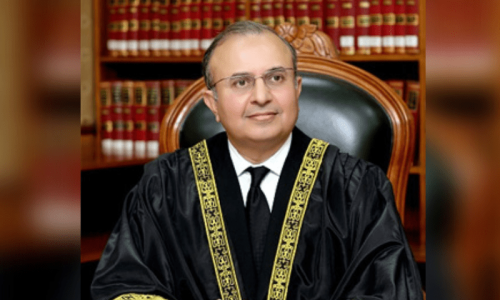A large number of these people is reportedly unregistered with government officials and have taken shelter in different parts of the city, it has been learnt.
Breaches in embankments along the Indus caused panic in Thatta district on Thursday night and forced people to move to safer areas. The number of already settled internally displaced persons (IDPs) in the city has crossed 38,000.
Speaking to Dawn, IDPs severely criticised the indifference demonstrated by government officials at a testing time and said they had reached Karachi after paying huge amounts of money to transport operators.
“There was panic and confusion everywhere and I had to spend Rs5,000 to bring members of my family here. I borrowed that amount on interest. We could only save our lives and left our homes in the evening,” laments Mohammad Ayub, who is from Sujawal tehsil of Thatta district.
Ayub suffers from tuberculosis and has endured a lot of trouble to reach the city. Along with his family, he has found shelter in a government school located in Ibrahim Haideri, Bin Qasim Town. The IDPs are being supported by a non-government organisation, the Kalachi Social Viable Association (KSVA).
The Moerro Mirbher Lower Government Secondary School is currently home to over 1,000 flood survivors, most of whom arrived from Thatta district on Friday morning.
“We were sleeping at night when announcements were made from loudspeakers that the floodwater was approaching and everyone must leave. We couldn't take anything in emergency. No government assistance was available and we had to walk for long hours from our village to Makli where we paid Rs2,000 for transport to Karachi,” said Mohammad Allah Dino, a resident of Darro town located on the left bank of the Indus.
Around 50 IDPs from Jacobabad were also found to be living in acute unhygienic conditions in a dilapidated building on the school's premises.
According to Mohammad Gabol, the school principal, the educational institution was functional till Thursday as it housed a limited number of flood victims.
“The 50 IDPs are living in a section that has been declared dangerous and abandoned a long time ago. Earlier, there were about 200 IDPs who lived in newly constructed area and later left for a Keamari relief camp. These activities, however, didn't disturb the educational activities. But, now, with a huge influx of IDPs this morning, we have no option but to close the school for some time,” he said.
Kiran Jamot, who represents the KSVA, complained that the organisation had not receive any assistance from the government though a significant number of IDPs had been living here for two months and the authorities had been informed about their needs.
“We do not have enough resources to arrange food or provide full medical care to these people. It's good that the government declared the school a relief camp today, but it must step in quickly to extend support,” she said.
Dr Taj Farooqui of the same organisation looking after the IDPs' medical needs said the number of diarrhoea patients at the camp was large and there was a desperate need for an ambulance service and emergency supplies at the relief camp.
'Only 1,471 registered'
Replying to Dawn's queries, deputy district officer (revenue) Shahzeb Kakar said that only 1,471 IDPs from Thatta district had been registered and settled in relief camps on Friday though their actual number was reportedly high.
“We had a desk on the National Highway that registered the IDPs today. But, I guess that their number could be as high as 10,000 as we are being informed about more and more IDPs who have settled in different parts of the city,” he said.
Regarding the problems at the Ibrahim Haideri relief camp, where a large number of IDPs are residing, he said the school had now been declared a government relief camp and all efforts would be made to attend to those people's needs.
“We would be sending food and medical supplies to this camp and its condition would improve,” he said, adding that the government would set up tented cities to accommodate IDPs currently sheltered in educational institutions so that children could continue with their studies.
About the lack of government support in transporting IDPs to Karachi, he said that around 200 vehicles were sent to bring the displaced people to the city, but only a few came by those vehicles. “Many may have gone to Badin and Mirpurkhas so that they can return in time once the floodwaters recede,” he claimed.










































Dear visitor, the comments section is undergoing an overhaul and will return soon.